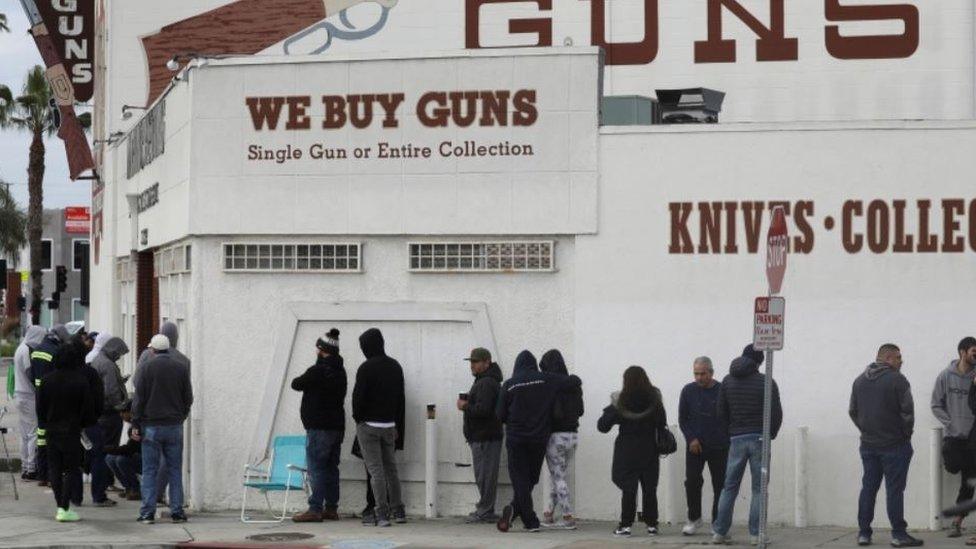Coronavirus: Trump says coronavirus crisis may last all summer
- Published
Trump tells Americans to avoid public spaces
US President Donald Trump has said the nationwide coronavirus emergency could last until the end of the summer or even longer.
He said Americans over the next 15 days should not gather in groups of more than 10 and avoid bars, restaurants, food courts, gyms and crowds.
At the White House, Mr Trump said the country is facing "an invisible enemy" that is "so contagious".
The US has so far had more than 4,600 cases of the virus and 85 deaths.
There have been more than 180,000 confirmed cases of Covid-19 globally and over 7,100 deaths, according to a tally from Johns Hopkins University.
What are the new US guidelines?
Under the US coronavirus task force's other recommendations announced by Mr Trump on Monday:
All older Americans are urged to stay home, while work and schooling for everyone should be from home
Discretionary travel, shopping trips and social visits should be avoided and people should stay away from nursing homes or retirement facilities
Anyone in a household who tests positive for the virus should remain at home along with everyone who lives there
"We've made the decision to further toughen the guidelines and blunt the infection now," a sombre-sounding Mr Trump told reporters.
"We'd much rather be ahead of the curve than behind it."
Asked how long the emergency would last, Mr Trump - who previously predicted the outbreak would be over in weeks - told reporters: "They think August, could be July, could be longer than that."
White House coronavirus response co-ordinator Dr Deborah Birx, who joined the president, said: "If everybody in America does what we ask for over the next 15 days, we will see a dramatic difference."
She issued an appeal directly to millennials, asking them to limit social contact even though they are at lower risk of suffering if they contract the virus.
"They are the core people that will stop this virus," she said. "We really want people to be separated."
Dr Birx also warned against socialising even if people feel well.
"We know that there is a large group of infected people who are asymptomatic, who continue to spread the virus," she said.
Everything you need to know about the coronavirus explained in one minute
What else did President Trump say?
Mr Trump also said the US "may be" heading for a recession. After his news conference, the stock market fell more than 12% in its worst day since 1987.
The president, who has been criticised for initially playing down the seriousness of the virus, was asked by a reporter how he would score his administration's response to the crisis on a scale of one to 10.
"I'd rate it a 10," he said. "I think we've done a great job."
The president said he did not yet plan to call for domestic travel restrictions or a national curfew or lockdown, though added: "We may look at certain areas, certain hot spots as they call them."
Mr Trump told reporters he had not yet decided to close the US-Canada border, but said it was something the administration was considering.
As the White House works on a financial assistance package for the beleaguered US airline industry, Mr Trump said it was right to help them as "it's not their fault".
A trade group for major airlines said the sector requires more than $50bn (£40bn) in aid to survive.
How are US states responding?
At least 40 US states have declared an emergency over the virus, and 29 states are shutting schools.
Millions of Americans are already working from home and city centres around the country - including Times Square in New York - are drastically less crowded.
On Monday, officials in the San Francisco Bay area issued a sweeping shelter-in-place order affecting nearly seven million people.
San Francisco is placing itself on lockdown for three weeks from midnight on Tuesday. The California city will legally ban residents from venturing out of their homes except to meet basic needs including buying groceries or medicine.

Gun sales are reportedly up in the US, including at this store in Culver City, California, where people queued outside
New York, New Jersey and Connecticut announced a tri-state approach to closures, with a shutdown of bars, restaurants, cinemas, casinos and gyms from Monday night for "as long as necessary".
Pennsylvania, the District of Columbia, Ohio, California, Illinois, Michigan, Massachusetts and Washington state have also advised residents to avoid bars and restaurants.
For the first time in over a century, the US Supreme Court postponed oral arguments.
A Kentucky coronavirus patient has meanwhile been placed under police guard after refusing to quarantine himself.
A local judge declared a state of emergency in order to force a "self-isolation" on the unnamed 53-year-old man.
A Texas person was charged with making a "false report" after posting on social media over the weekend that they had tested positive for the virus.
CNN reports that Mr Trump's Mar-a-Lago resort in Florida is closed for deep cleaning after several individuals who visited the golf club tested positive for coronavirus.
What about the election?
The outbreak is also disrupting primary season in the US as Democrats hold state-by-state votes to pick a candidate who will challenge Mr Trump in November. It is now a two-man race between Vice-President Joe Biden and Senator Bernie Sanders.
On Tuesday, four states are scheduled to vote: Arizona, Illinois, Florida and Ohio.
But Ohio's governor said late on Monday polls would be postponed to comply with public health warnings against gatherings of more than 50 people.
Georgia, Louisiana and Kentucky have already postponed their contests due to the outbreak. Wyoming has suspended in-person voting.


EASY STEPS: How to keep safe
A SIMPLE GUIDE: What are the symptoms?
GETTING READY: How prepared is the UK?
TRAVEL PLANS: What are your rights?
